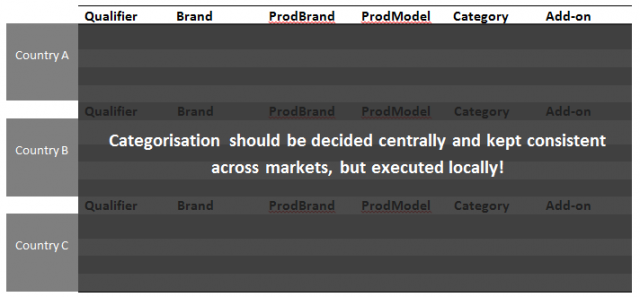It generated substantial buzz in the search marketing industry when eBay last week published research that overall deems SEM ineffective. Especially large scale companies that already enjoy a high degree of brand awareness will find little to no value in the advertising channel, the company argues.
Several PPC pundits have since fired back saying that SEM is nit the problem. Rather, they say, eBay simply “sucks” at the discipline. And admittedly, the plethora of examples they provide to support their case do not put the online auction and shopping giant in a particularly flattering light.
While I will not delve into the issue any further, I am convinced that search engine marketing can deliver substantial returns and support overall business objectives if managed properly. The sad reality, however, is that far too many companies continue to struggle with getting the most out of the channel. For international businesses this especially holds true since there is an added layer of complexity in having to deal with multiple markets, languages, and cultures.
So without further ado, here are 5 tips to get you on track for global SEM success:
1. Keyword categorisation is a central task – but research and selection should be done locally
Getting the right categorisation for your keywords is essential for international campaigns. These categories are ideally defined centrally and will remain unchanged across markets. There are several advantages of a fixed approach, such as consistency and unified reporting. This in turn will help you more accurately benchmark country performances, save time and money, and ultimately result in a better, more focused end result. Remember, it is easier for everyone to work within a single framework. Simplicity breeds understanding as the late, great Steve Jobs once said.
However, simplicity is not an invitation to be “lazy” or taking the path of least resistance. It has been pointed out time and again, but translating lists of English keywords is being utterly oblivious to the often striking differences between languages and subsequent search patterns across markets. The approach is backwards and broken for so many reasons and — contrary to common perception — counterproductive and potentially damaging to your brand. With this in mind, keyword research and selection should always be carried out by a native speaker with a decent understanding of PPC.
2. Get the C-suite on board
“It is all good chief, but we simply have not got the budget to employ native keyword researchers and copy writers. And generally we face little to no support from the people with the purse strings.”
Well, if your resources are too scarce to employ natives, at least do yourself the favour and run a visual verification on Google Images to ensure that your locally targeted keywords and ad copy are not misleading (or absolute gibberish) to the searcher. No better way to burn through the little budget you do have than by serving up ads that completely fail to meet consumer expectations.
But here is another (and better) idea, though. In fact, I would go as far as saying that you would be doing yourself a much bigger favour by following the approach below, which will help you overcome initial economic constraints and a general lack of support from the C-suite:
-
- Set up two identical ads – one in English and the other in the local language of the country you are targeting.
-
- Allocate the same budget for the two ads and compare performance.
-
- Now if you really want to prove your point, go create a single localised landing page and analyse how it stacks up against its generic English counterparts. Of course, for this approach to work your local language landing page will have to be on the money as far as translation goes.
If you do this and do not see any notable difference in performance, you can call me Al.
Joke aside, my point being: What is the one thing that all C-level execs understand? Numbers, am I right? Prove the impact on the bottom line and get the budget you deserve. And if it so happens that this budget will not stretch as far as to taking on new employees, several multilingual search agencies will be up for the task without you having to break the bank.
3. No universal best practice for PPC – thorough testing is imperative for consistent global success
Once you have hopefully made a convincing case to the people with the purse strings and got yourself some more budget to play around with, greater testing needs to be undertaken.
Even in the single market PPC is far from an exact science. The fact that there is no magic recipe for doing PPC may be a tough pill to swallow, but unfortunately that does not make it any less true. Now, add to that linguistic and cultural differences when expanding globally and you can multiply your uncertainty levels by a thousand. Consistently delivering great results on a global scale thus requires even greater devotion to testing.
A/B testing is arguably the most common way of doing this. Multivariate testing is another method where you have multiple versions of the same ad, however all ads carry identical elements – to a lesser or larger extent. For instance, you may decide to change the description only but keep the title and URL. Similarly, you may change the title but keep the URL and description.
Play around with it as you find appropriate, but be careful not to draw definitive conclusions based on results from small sample sizes.
4. The A’s of writing ad copy
Having said there is no universal best practice or guarantee for PPC success, there are of course some general guidelines that seem to work universally. These include:
-
- Adequate ad for keyword and landing page: Do not put all your eggs in one basket. Have multiple ads and landing pages within the same campaign.
-
- Action terms: PPC can be applied to many different scenarios, but it is generally targeted at users deeper down the conversion funnel. Including clear calls-to-action like “shop”, “buy”, “join” etc. is essential.
-
- Attract attention: Include symbols and local trust anchors in the copy ($, €, AM/PM, etc.).
-
- Ad environment: Thorough analysis of the competitive environment in your vertical in the local market is of the essence for writing effective ad copy. You may find that average CPCs, CTRs, ad depth (how many ads are shown for your targeted keywords) etc. differ notably, even between seemingly similar countries/markets.
5. Use PPC insights to inform and shape SEO strategy
Finally, PPC can be an incredibly effective marketing tool for obtaining valuable market insights in unknown territory. Which search terms are being used? Which ads are being clicked? What converts? What does not? These initial insights will serve as a brilliant starting point for defining and developing highly effective SEO strategies in the locale.
If you stop treating SEO and PPC as were they two separate entities, soon enough you will discover the tremendous value of deploying a holistic approach to global search marketing.
While no guarantees can be made, following these tips will get you off to a good start.
Immanuel Simonsen
Latest posts by Immanuel Simonsen (see all)
- Is Baidu losing its crown in China? - July 31, 2015
- Global logistics brand DHL eyes Chinese e-commerce growth - July 27, 2015
- VKontakte To Launch Rival To Instagram - July 21, 2015









Hope your tips will help me 😉
Thanks for sharing
[…] Check out this article for 5 essential tips for global SEM success. […]